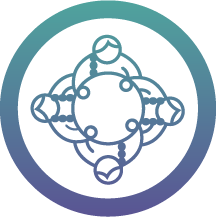Are there meaningful engagement and collaboration processes according to First Nations, Inuit and Métis which advance their self-determined data and research initiatives to improve cancer care outcomes? What do those look like?
Why is this indicator important to First Nations, Inuit and Métis?
In order to effectively address cancer care needs, First Nations, Inuit and Métis Peoples must have a voice in shaping solutions through data and research that respond to unique challenges and honour understandings of wholistic well-being.
Importantly, First Nations, Inuit and Métis Peoples have the right to develop self-determined priorities and strategies for all sectors, including health.
Community engagement involves building trusting, reciprocal relationships to seek guidance and direction from First Nations, Inuit and Métis governments, organizations and community leaders to develop strategies and approaches to address cancer care needs. The Tri-Council Policy Statement: Ethical Conduct for Research Involving Humans – TCPS 2 (2022) provides some guidance as to how community engagement for research should be undertaken.
View Indigenous determinants of health
How does this affect care and outcomes?
When First Nations, Inuit and Métis governments, organizations and communities are engaged and lead the research and data work in developing self-determined solutions, the potential for system change to address gaps in cancer care and outcomes is greater.
Such strategies can improve the performance of the cancer system for First Nations, Inuit and Métis patients and families in a way that honours their concepts of health and well-being.
Moreover, by building on the knowledge and practices of First Nations, Inuit and Métis governments, communities and organizations, efforts to reduce the burden of cancer in communities can be strengthened.
Towards health equity
Despite significant improvements in cancer prevention and care, not everyone in Canada is benefiting equally.
First Nations, Inuit and Métis Peoples continue to face systemic barriers to high-quality care—and the resulting disparities in access, experience, and outcomes persist.
When communities can see the benefits of cancer research and are meaningfully involved in all aspects of the research (including choosing the topics, designing and participating in the study, and interpreting and having a voice in the results) the results are richer and progress is made towards health equity
What this would mean for people in Canada
All people in Canada would have equitable access to quality cancer care.
View indicator development process
View ways of measuring the indicators

